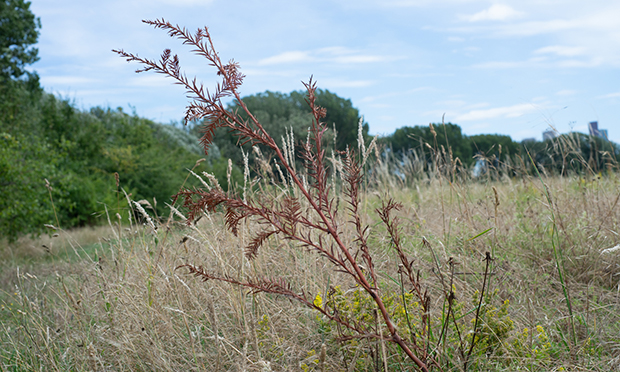Council blames extreme weather for deaths of newly-planted trees on Hackney Marshes

The Town Hall is preparing to establish how many trees recently planted on Hackney Marshes have survived after images circulating on social media appeared to show a large number as having sadly died.
The marshes were the first place in the borough to see new planting under council commitments to plant three football pitches’ worth of trees over the next two years, with volunteers pitching in to help embed thousands of fruit and nut trees, broadleaf specimens and shrubs to create an edible woodland.
The council’s partnership with charity Trees For Cities, through which drinks company Honest Organic funds the trees, means all specimens which have not survived will be replaced.
The failure of so many plantings has been put down to hot weather in May, with the council stressing that all planned aftercare for the trees did take place.
A Hackney Council spokesperson said: “We worked in partnership with charity Trees for Cities, the Tree Musketeers and local volunteers to plant the trees on Hackney Marshes, which were funded by Innocent Drinks. This is part of a commitment to plant over 36,000 trees in the borough by 2022.
“As part of our agreement, Trees for Cities will replace any saplings that do not survive. We are meeting with them in the coming week to determine those that need to be replaced.
“Unfortunately, this period of extreme weather, one of the things that urban tree planting can help to mitigate, has impacted on their ability to establish.”
According to the council, all trees on the marshes were planted in February during planting season, mulched regularly and watered during May, which was the driest on record in England with 9.6mm of rain, despite, the Town Hall said, it “not being standard practice to artificially water new saplings”.
It was previously reported that Trees for Cities, which delivered over a million trees since the early 90s, would contribute to aftercare after plantings were carried out.
Responding to the news on social media, a spokesperson has said that its urban forest team is to look into the situation.
The trees were supposed to have been planted in order to capture carbon as well as for the promotion of biodiversity and to encourage the community to learn more about foraging for edible fruit, nuts and leaves such as hazel, walnut and crab apple.
Speaking to the Citizen, Debbie Mitchener of community interest company Cordwainers Grow called the situation a “shocking waste”.
Mitchener added: “It’s heartbreaking to see this. All that work. And they’re living things, so it really does upset me. People get upset if animals get hurt, and I think trees are quite similar.”
Trees for Cities and Tree Musketeers were both approached for comment.
Update: this article was amended at 11:03 on Tuesday 25 August 2020. The trees were planted in February, not May as originally stated.
